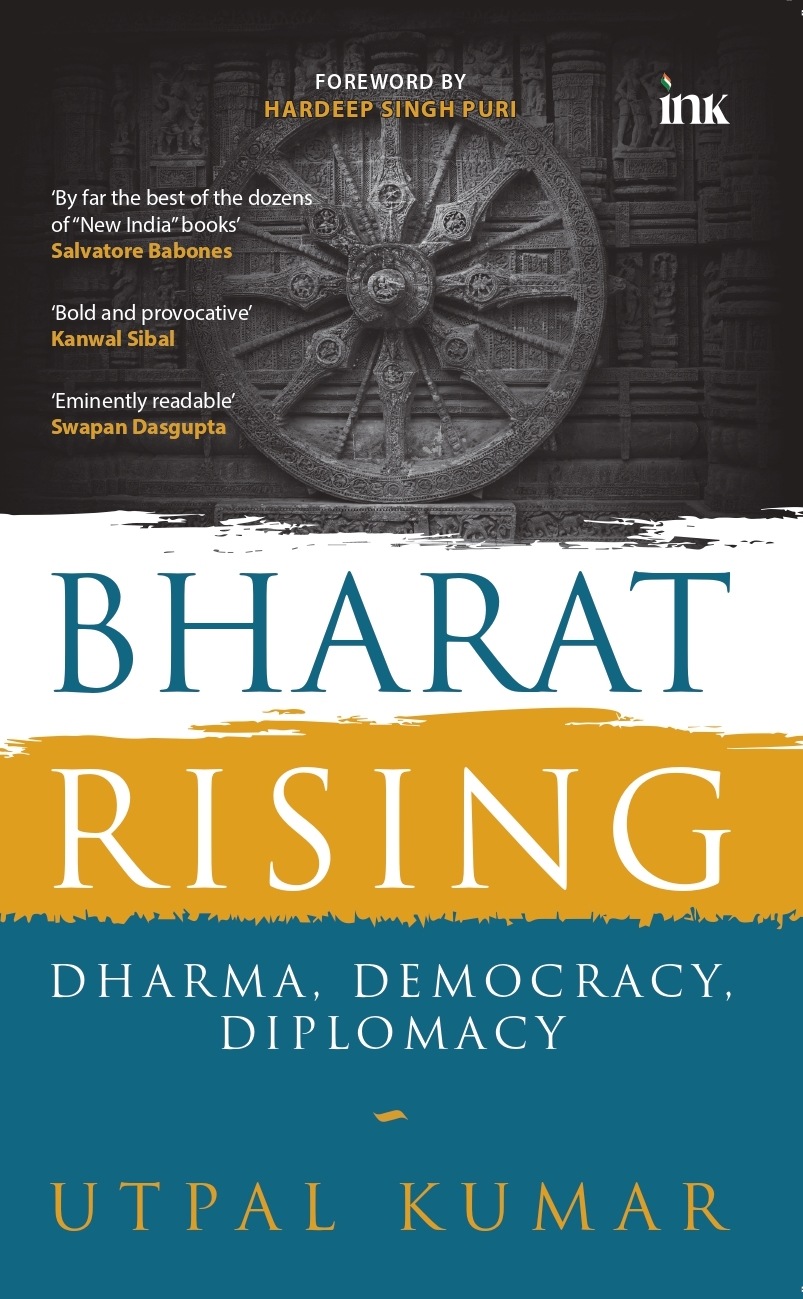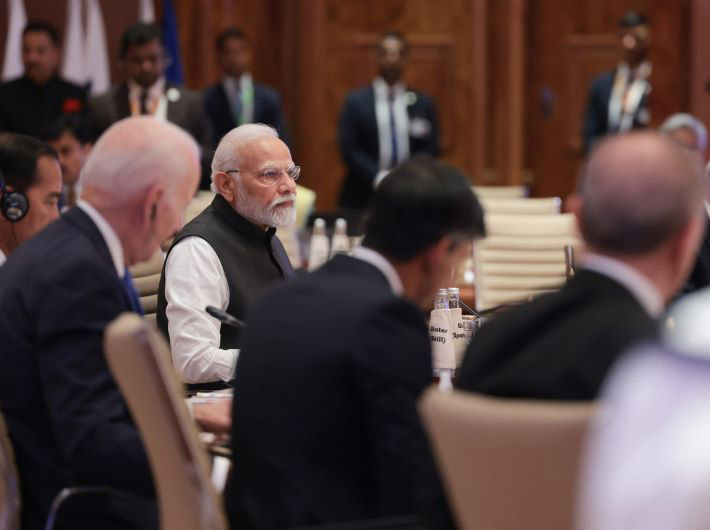Bharat Rising: Dharma, Democracy, Diplomacy
By Utpal Kumar
BluOne Ink, 268 pages
 ‘Bharat Rising: Dharma, Democracy, Diplomacy’ by Utpal Kumar, who has two decades of journalistic experience, not only sets the narrative right about ‘Naya Bharat’ but also attempts to call the democratic, secular, and liberal bluff of the Nehruvian golden era of the 1950s and after.
‘Bharat Rising: Dharma, Democracy, Diplomacy’ by Utpal Kumar, who has two decades of journalistic experience, not only sets the narrative right about ‘Naya Bharat’ but also attempts to call the democratic, secular, and liberal bluff of the Nehruvian golden era of the 1950s and after.
The book, coming out on Republic Day, is divided into two sections: one chronicles India's new historical awakening, as it talks about why new India is no longer apologetic about its civilisational past; and why Hindu temples continue to be administered by the secular state when the same rule is not applied to the religious institutions of other religions; why UCC is important, but Hindus should tread carefully on the issue and more
The second section talks about why India and the US-led West can be friends, if not ‘frenemies’, but not allies; why India has been duped so often and easily by China; why India and Pakistan can never be friends; and why Western liberal media writes India’s obituaries.
With a foreword from union minister Hardeep Singh Puri, ‘Bharat Rising’ is an earnest exploration, providing readers with a well-researched argument and a deeper understanding of India's contemporary narrative.
Here is an excerpt from the second section of the book:
Brave New Diplomacy in an Uncertain World
A pro-active foreign policy in search of a rightful place in the comity of nations
The world today has all the makings of the Cold War 2.0. Similar to the US–USSR rivalry during the Cold War, the Americans now have a new adversary in China. As was the case between 1945 and 1991, we are today witnessing not just a battle between two nations but two competing ideologies and contrasting systems of governance.
India, in Cold War 1.0, erred critically in choosing a wrong partner. That mistake, though understandable given India’s bitter colonial experience and also the elongated progressive halo of the Leftist movement then, cost the country dearly—from facing territorial, geostrategic setbacks to the sliding of India’s economy, thanks to the moribund socialist policies followed post-Independence.
New India, amidst Cold War 2.0, cannot afford to choose a wrong partner again. Despite ‘creative differences’ with the West, New Delhi’s long-term interest lies with the American global order, though India needs to retain its traditional friendship with countries like Russia and Iran. A multipolar world is the ideal pitch on which India should want to play and shape the global order.
Against this backdrop, Indian diplomacy under Prime Minister Modi has been almost seamless in the country’s transformation from being a soft power to an aspiring hard power. It is no longer shy about taking the bull by the horns, as it was vis-à-vis China when the People’s Liberation Army (PLA) troops tried to change the status quo at the Line of Actual Control (LAC) in eastern Ladakh in May 2020. It also didn’t shy away from exposing the Western hypocrisy over Ukraine and stood its ground despite the tremendous pressure points created by the US and its European allies.
India has also rewritten the rules of engagement with Pakistan through its Uri (2016) and Balakot (2019) operations. Now, the accountability for a terror activity operating on Pakistani soil lies squarely with Pakistani rulers. The Indian leadership, in the past, can be accused of pampering and patronizing Pakistan in the hope of improving ties. The Modi dispensation, by doing away with this kind of ‘cosmic’ diplomacy, has helped India come out of needless regional tangles and instead focus on bigger games and larger pictures. Indian diplomacy under the Modi government is slowly shedding the much-entrenched Panipat Syndrome, originally coined by the late military strategist Jasjit Singh. The change is already perceptible as India is consciously trying not to look the other way when threats come knocking on its doors. Not only has it begun to take challenges head-on, but it can also be seen coming up with a long-term, futuristic worldview in matters of diplomacy and geostrategy; however, it’s a work in progress and still has a long way to go. One gets a sense of an assertive Indian diplomacy, without being offensive, of course, in the manner in which it has organized G20, Quad, and SCO summits almost simultaneously in 2023. It is a tribute to new India’s clarity of mind and growing confidence in its own abilities in shaping itself and the world without being apologetic and underconfident about it.
As Jaishankar told the audience at the 2023 Raisina Dialogue organized by the Observer Research Foundation (ORF):
“Look, we are not apologetic. I do believe—because I keep reminding people of 2004, because to me, if your origins are in common good, there’s a lot—there’s an innate virtue in your existence […] so we do stand for something. What I would not like to be defined as is standing against something or somebody, because that diminishes me.”
New India is willing to ‘transcend the old framework of analysis’. This was evident when it refused to fall in line with the West in condemning Russia for Ukraine. India, in sharp contrast, took its supreme national interest into consideration. For, any attempt on India’s part to side with the US-led West on Ukraine would have inevitably pushed Russia deeper into the Chinese orbit, thus compromising its own national and military interests.
With regard to Ukraine, India also subtly pointed at the larger failure of American diplomacy. Losing a potential ally in Russia against the backdrop of growing Chinese hegemony, driven by NATO’s persistent expansion into Eastern Europe over the past three decades, is a move that George F. Kennan, best known as an advocate of a policy of containment of Soviet expansion during the Cold War, has called a ‘fateful error of American policy’. The Ukraine war is the result of that eastward expansion of NATO. Had the US realized that the gravity of power has shifted from Europe to Asia and that China is currently the biggest threat, it would not have pushed Moscow deep into the Chinese orbit. After all, Russia too has its reasons to be concerned with the dragon spreading its wings in Central Asia, which Moscow traditionally regards as its strategic backyard.
In a time when ‘the US may have weakened, but China’s rise is still far from maturing’, as Jaishankar writes in The India Way, this geopolitical shift has created new opportunities for ‘middle powers’ such as India. By the end of the 2020s, India is poised to become the third-largest economy in the world, paving the way for a multipolar world. Explaining the multipolar world, Jaishankar writes, ‘What will emerge
is a more complex architecture, characterized by different degrees of competition, convergence and coordination. It will be like playing expanded Chinese Checkers, including with some who are still arguing over the rules.’
India, truly, has entered a phase of brave new diplomacy, which is assertive and pro-active but steers clear of being offensive in any way.
[The excerpt reproduced with the permission of the publishers.]
